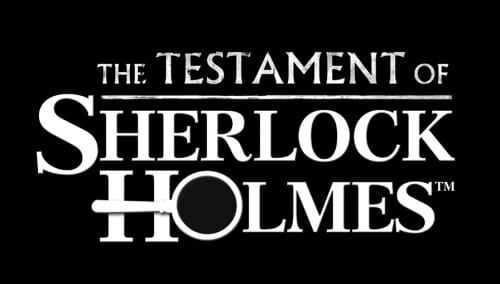 In this, the busiest time of the year for video game releases, we are inundated with fast-paced, Hollywood blockbuster-styled video games, filled to the brim with epic set pieces, sweat-inducing quick time events, jaw-dropping graphics, and a non-stop roller coaster ride of excitement. So it’s interesting to see Atlus publishing a game so distinctly opposite of everything else, right in the middle of one of the most action-packed seasons of the year. If Call of Duty is like a Michael Bay film, then The Testament of Sherlock Holmes, from developer Frogwares, is like an installment of a PBS drama.
In this, the busiest time of the year for video game releases, we are inundated with fast-paced, Hollywood blockbuster-styled video games, filled to the brim with epic set pieces, sweat-inducing quick time events, jaw-dropping graphics, and a non-stop roller coaster ride of excitement. So it’s interesting to see Atlus publishing a game so distinctly opposite of everything else, right in the middle of one of the most action-packed seasons of the year. If Call of Duty is like a Michael Bay film, then The Testament of Sherlock Holmes, from developer Frogwares, is like an installment of a PBS drama.
Following his previous adventures versus Jack the Ripper and a cult straight out of an H.P. Lovecraft novel, we see Sherlock Holmes at his lowest point in his adventures. After being accused of stealing a set of jewels, our crime-busting hero stumbles upon a series of grisly murders induced by a mind-altering poison and takes the law into his own hands. What lengths will Sherlock Holmes go to clearing his name? Is everything happening according to Sherlock’s plan, or is this case too much for even the world’s greatest sleuth? Will Watson ever grow a backbone? The answers to these questions unfold in a much more methodical manner than your typical console experience.
[singlepic id=9402 w=320 h=240 float=left]While most games tend to play out like a big budget action movie, The Testament of Sherlock Holmes plays like a long novel. More patient gamers (and fans of Sherlock Holmes in general) will find a lot to like in the story here, as the story and characters are much more faithful to the actual stories of Arthur Conan Doyle. It’s a pretty dark story, rife with drug abuse and mutilations, set within the dingy, grimy streets of 19th century London, and the plot is a nice, slow burn through the roughly 10-12 hour game. It stays pretty compelling throughout, despite middling to awful voice acting (one of the character’s German accents sounded distinctly like Ludwig von Drake). You’ll be talking to suspects, inspecting clues, gathering evidence, and solving puzzles to progress through the game instead of shooting everything in sight, and if that’s your cup of tea, you’ll be right at home here.
Progression through the game follows typical adventure game tropes: talk to everyone you can and exhaust every single dialog option possible; walk through a given area and press the action button on every single point-of-interest to inspect or pick up anything out of the ordinary; combine every item in your inventory to create an item to use; and so on. On average, most of the puzzles are interesting and thought provoking, and since Sherlock Holmes’ world is firmly rooted in reality, the item puzzles make sense and there aren’t any huge leaps in logic, which tend to be one of the big complaints about adventure games in general. While these puzzles aren’t that difficult, the contraption puzzles that you’ll find will tend to be the ones that cause the most frustration. One puzzle in particular requires you to slide numbers around in groups of two to unlock a safe and after about a half hour I wanted to throw my controller at a wall in frustration. Rounding out the puzzle list is a series of deduction puzzles which require you to piece together different trains of thought to form a cohesive view of the case so far. Interesting in theory, these puzzles tend to resort to picking random options from a list until everything falls into place, and don’t quite live up to their lofty concept.
[singlepic id=9408 w=320 h=240 float=right]If you get stuck at all during your travels, the game provides you with a few options to bypass certain sequences. During exploration, you can press the left trigger to activate Holmes’ “Sixth Sense,” which makes a cursor pop up over any interactive objects on the screen. This helps a bit, but sometimes, during particularly egregious pixel hunts, even this hint system is useless, as you generally have to be looking in the general direction of the item to make the icon pop up; if it’s just out of sight, nothing will happen. The other option occurs during the contraption puzzles, and will let you flat out skip a puzzle if you take more than a couple of minutes to solve it. While it’s nice that something like this is available for people who want to continue the game without getting bogged down by puzzles, it pretty much defeats the purpose of the game. Further, other than missing an achievement for not skipping any puzzles, there is absolutely no consequence to using either of these hint systems (in fact, there’s an achievement for using your “Sixth Sense” a bunch of times).
The Testament of Sherlock Holmes is incredibly linear, which both works for and against it. On one hand, it means that all items can be found in one area, and all puzzles will be solved before you go on to the next location. It keeps things from being too confusing, and prevents the game from bogging down because you didn’t pick up the one item three locations over to solve the puzzle somewhere else. On the other hand, it means that there isn’t a whole lot of choice or exploration in the game. Other than a section near the beginning where you can choose the place to start your investigation, that’s really the only influence you have over where the game will take you.
To accompany Sherlock Holmes’ first adventure in high definition, Frogwares has created a new engine to take advantage of it. Or, that is the theory, at least. Animations look incredibly stiff, where interacting with items in the environment follows a “place hand on object/object disappears into inventory” motion. Character’s lip movements never match up with their voices, the default brightness levels are incredibly dark, and the graphical level of the entire game just feels like an original Xbox game that was upscaled to high definition. Sherlock Holmes was also not optimized for the console experience, as the text is far too small on a big screen TV, making it virtually impossible to read anything or solve some of the more involved puzzles without having to squint up close to the screen.
[singlepic id=9410 w=320 h=240 float=left]Interacting with your environment can be a chore as well. You have two options for navigating as Sherlock Holmes, first- and third-person, and both are pretty frustrating. Third-person navigation gives you a wider view of your surroundings, but tends to feel constrained in tight spaces. It also causes tons of glitches when interacting with items or doors; Sherlock will stand rigidly in place after opening a door, despite all my efforts to jam on the thumbstick, or won’t even activate the animation to open a door in the first place. You can switch to first-person view with a tap of a button, and while character movement and item interaction is much cleaner in this mode, the view of your surroundings feels much more claustrophobic, and it can be hard to see certain clues in this view.
Despite some interesting ideas and the allure of playing as the greatest detective in literary history, The Testament of Sherlock Holmes suffers because of its unwavering linearity, its numerous glitches, lack of graphical polish, its absolute absence of replay value, and sub-par optimization for the console experience. In such a busy season for gaming, it’s hard to recommend a game of such middling quality at full price when there are other, far better adventure games out there for the same, if not less money than this. If you’re a die-hard Sherlock Holmes fan and can look past some significant flaws to experience an authentic Sherlock experience, then by all means, go for it. Otherwise, stay away.
I've been gaming since my dad made the bad decision of buying me a Nintendo when I was four years old. Every day I'd find myself with my face glued to a TV screen, punching away at buttons, getting furious with Bowser, Dr. Wily, and those freakin' birds in Ninja Gaiden. Since then I have failed to get my parents to play any board game with me, I sold my full copy of Earthbound with box and guide for $300 to some dude in Austria for rent money, and I still believe in Nintendo even after all these years.

See below for our list of partners and affiliates:























